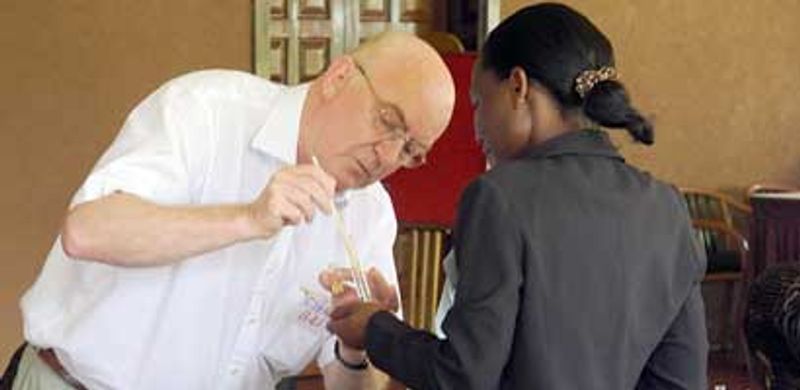

Dr. Chris Leaver helping a Ugandan journalist learn how to extract DNA
In the absence of some sort of a regular food production monitor, has been cited as a sign that food supply is failing to keep pace with demand.
The rapid destruction of Uganda’s forest cover across the country in search of virgin agricultural land and the bloody conflicts over land seen in several parts of the country, not to mention landslides in the Mt. Elgon region due to excessive pressure on land, are ominous signs that something dramatic must be done to significantly boost food production in this country in order to avoid additional conflict and other forms of social and economic unrest arising from food shortages.
Apparently, scientists and food policy makers believe that in Africa and in Uganda in particular, there is immense untapped potential in using biotechnology to improve food production which would not only ward off conflict, but would also raise the standards of living of ordinary people more so small holder farmers.
A new programme dubbed Biosciences for Farming in Africa which targets journalists in four African countries including Uganda, has been launched with the goal of enhancing the understanding and hence adoption of modern agricultural biotechnology especially focusing on improved seeds.
The John Templeton Foundation in the United States and the Malaysian Commonwealth Studies Centre are funding the three year programme that will target equipping journalists in Uganda, Ghana, Nigeria and Tanzania with knowledge and skills to be able to interpret and change attitudes of farmers towards improved plant breeding.
As remarked by Professor Sir. Brian Heap, the project leader of the Plant Breeding and Genetics programme at the John Templeton Foundation, journalists enjoy a unique advantage to transfer new knowledge to small holder farmers in society.
Prof. Heap argues that although plant breeders and geneticists have done ‘a fantastic job’ of keeping famine at bay in most parts of the world, Africa has not benefited in similar fashion.
Prof. Heap argues that: “Many people think this century will be the century of Africa. It needs to be because the world population continues to grow and especially in Africa where the challenges and opportunities are greatest.”
Dr. Bernie Jones, a scientist from Cambridge in the UK and the B4FA project leader believes that the programme will empower journalists to increase understanding and dialogue about biosciences and plant breeding in Africa with the aim of improving the lives of ordinary farmers.
Between October 31 and November 3, a group of 21 Ugandan journalists representing print, electronic and online media outlets underwent a four-day residential training on biosciences that took place at the Speke and Commonwealth Resort in Munyonyo Kampala.
The journalists had the opportunity to learn about plant breeding concepts such as hybridization, tissue culture, genetically modified organisms (GMOs). And as commented by Ms. Sarah Natoolo, a reporter with the State Owned UBC radio, the intensive exercise helped her better understand the science of plant breeding.
“The lectures, practical exercises and field trips that were conducted by experienced scientists from Uganda and other countries, plus the guidance we got from veteran journalists made the programme quite educative but also entertaining,”
Ms. Natoolo adds: “I believe that as a country, we face enormous challenges in ensuring that the rural masses understand and use the new technologies to grow more food and get to live happier lives. I am confident that as a communicator I can use the acquired new knowledge to explain things better.”
Apart from the heavy menu on the history and contemporary state of plant breeding techniques and the significant impact it has had on transforming economies such as the US, Argentina and China among others, the course provided journalists with an opportunity to appreciate the status of plant breeding in Uganda.
The journalists for example got to know that Ugandan Mr. Erostus Nsubuga has built a successful business from plant breeding.
Currently, Mr Nsubuga owns and operates a near monopoly business under his AGT Laboratories which has a multi-billion tender to supply disease-free planting materials for Coffee and Bananas to the Uganda government. Besides, Mr. Nsubuga manages to sell his planting materials to individual farmers in Uganda and in Rwanda.
The course brought to light the fact that Uganda’s pioneering research in developing disease resistant banana varieties, through genetic modification (GM) has brought international spotlight and praise to the country and the research experiment in particular that is ongoing at the National Agricultural Research Laboratories at Kawanda.
But as noted by several speakers including Dr. Theresa Sengooba, the Uganda Coordinator of the Program for Biosafety Systems (PBS) journalists who have benefited from the B4FA training should be more active in reporting on biotechnology issues.
“My expectation is that journalists will relate better with scientists and technical people such that they report from an informed point of view,” said Dr. Sengooba.
Mr. Daniel Otunge, the Coordinator of the Open Forum on Agricultural Biotechnology in Africa (OFAB) added that besides translating scientific information for farmers, journalists face more challenges especially in analyzing and interrogating individuals, institutions and laws that affect the whole value chain of seeds in Uganda.
From investigating cases of counterfeit seeds on the market to holding seed companies responsible when their products gets excessively counterfeited would build integrity into the system of seed development in the country, argued Otunge.
These are certainly no mean tasks. But as noted by Prof. Christopher Leaver, an eminent scientist from Oxford University UK who has dedicated the rest of his life to increasing understanding of biotechnology around the world, the current challenges facing Uganda especially population growth and climate change mean that the current agricultural practices are unsustainable and adoption of biotechnology to increase yields is one of the most promising solutions.














Sunrise Admin
Leave a Comment
Your email address will not be published.